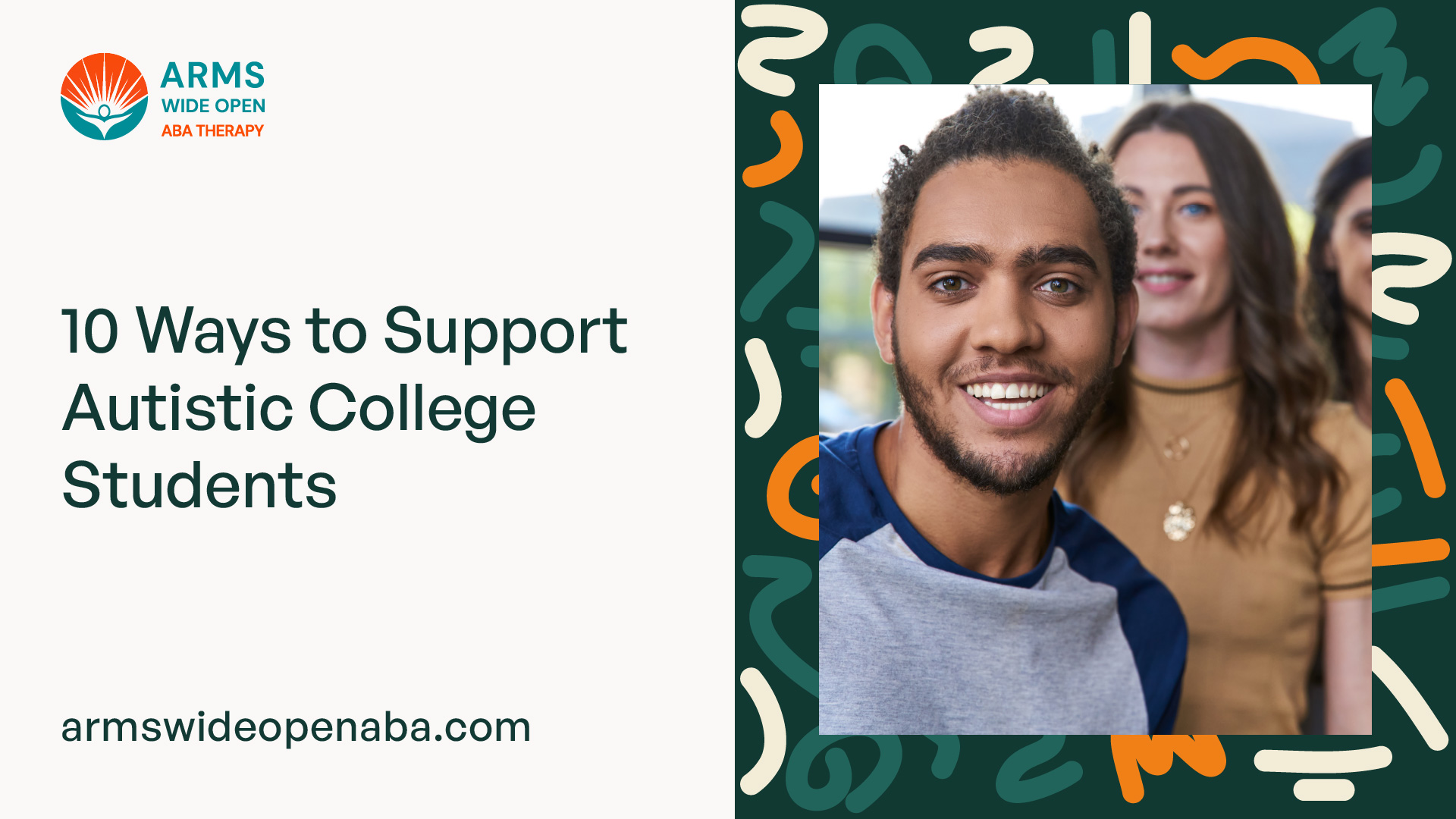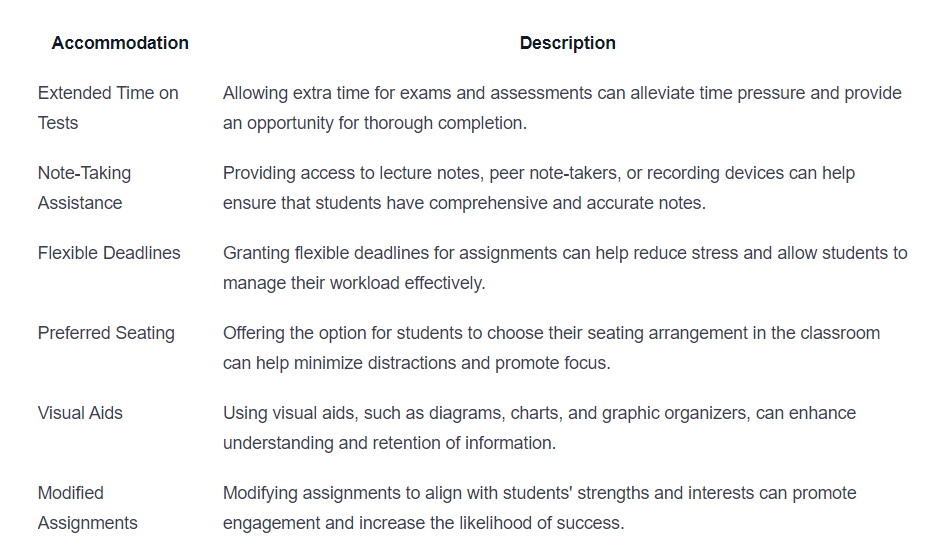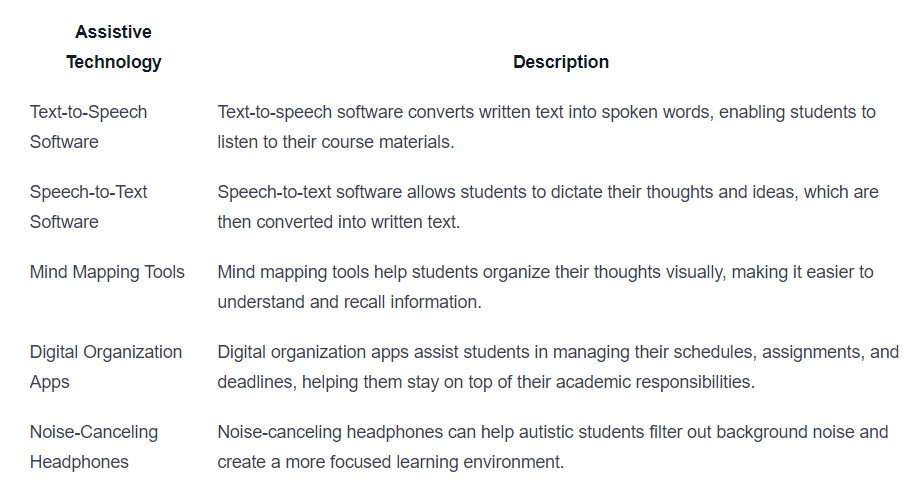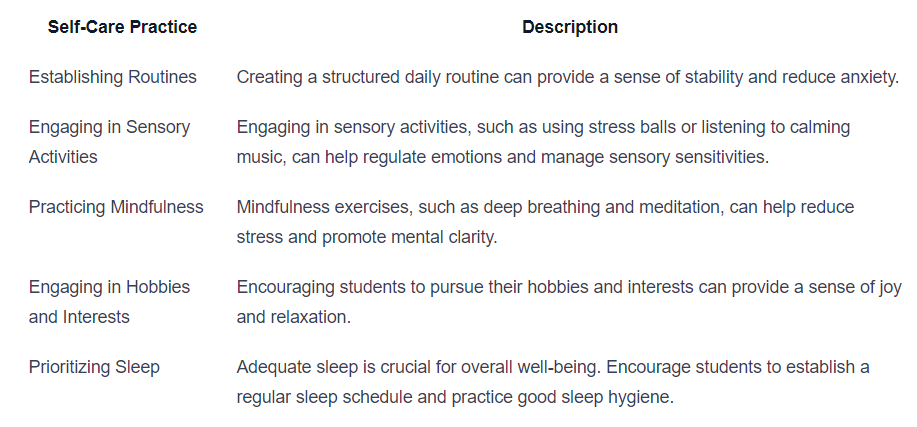10 Ways to Support Autistic College Students
Discover 10 essential ways to support autistic college students and foster their success in an inclusive environment.

Understanding Autism in College
Autistic college students face unique challenges in navigating higher education. Understanding these challenges and implementing supportive measures is crucial in creating an inclusive and nurturing environment for their academic success.
Challenges Faced by Autistic College Students
Autistic college students encounter a range of challenges that can impact their educational experience. These challenges may include:
- Social Communication Difficulties: Autistic individuals often struggle with social interactions, making it challenging to build connections with peers, participate in group activities, or engage in classroom discussions.
- Sensory Sensitivities: Many autistic individuals have heightened sensory sensitivities, which can be overwhelming in the college environment. Bright lights, loud noises, and crowded spaces can cause sensory overload and hinder their ability to focus.
- Executive Functioning Issues: Executive functioning refers to a set of cognitive skills, such as organization, time management, and planning. Autistic college students may experience difficulties in these areas, making it harder to keep up with assignments, manage deadlines, and prioritize tasks.
- Transition and Change: Transitioning to college can be particularly challenging for autistic individuals, as they may struggle with adapting to new routines, environments, and expectations. The shift from high school to college brings increased independence and responsibilities that can be overwhelming.
Importance of Supportive Measures
Implementing supportive measures is vital to ensure the success and well-being of autistic college students. These measures can help create an inclusive environment that fosters their academic and personal growth. Some key reasons why supportive measures are important include:
- Equal Access to Education: Providing support and accommodations ensures that autistic students have an equal opportunity to excel academically and reach their full potential.
- Reduction of Stress and Anxiety: By addressing the challenges faced by autistic students, supportive measures can help reduce stress and anxiety, allowing them to focus on their studies and overall well-being.
- Promotion of Self-Advocacy: Implementing supportive measures empowers autistic college students to advocate for their needs and rights. It encourages self-advocacy skills development, which can benefit them throughout their lives.
- Enhancement of Mental Health: By offering support tailored to their unique needs, we can promote the mental health and overall well-being of autistic college students. This contributes to a positive college experience and sets the foundation for future success.
Understanding the challenges faced by autistic college students and recognizing the importance of supportive measures lays the groundwork for creating an inclusive and empowering environment. By addressing these challenges head-on, we can ensure that autistic students have the opportunity to thrive academically, socially, and personally during their college journey.

Creating an Inclusive Environment
To effectively support autistic college students, it is crucial to create an inclusive environment that caters to their unique needs. This can be achieved through the provision of accessibility resources and offering sensory-friendly spaces.
Providing Accessibility Resources
Providing accessibility resources is essential for ensuring that autistic college students have equal opportunities to succeed. These resources can include:
- Accessible Campus Facilities: Ensure that campus buildings, classrooms, and other facilities are accessible to students with physical disabilities. This may involve installing ramps, elevators, and accessible restrooms.
- Digital Accessibility: Make sure that online learning platforms, course materials, and campus websites are accessible to students with visual or hearing impairments. This can be done by providing alternative text for images, closed captioning for videos, and screen reader compatibility.
- Note-Taking Assistance: Offer note-taking assistance for students who may struggle with taking comprehensive notes during lectures. This can be done through peer note-sharing programs or by providing access to lecture recordings.
- Extended Time for Exams: Provide extended time for exams and assignments to accommodate students who may need additional time due to processing differences.
By implementing these accessibility resources, colleges can create a more inclusive environment that supports the academic success of autistic students.
Offering Sensory-Friendly Spaces
Sensory-friendly spaces are designed to minimize sensory overload and provide a calm and supportive environment for autistic college students. These spaces can help students manage sensory sensitivities and reduce anxiety. Some ways to offer sensory-friendly spaces include:
- Designated Quiet Areas: Designate specific areas on campus where students can retreat to when they need a quiet and calming space. These areas can be equipped with comfortable seating, dimmed lighting, and noise-cancelling options.
- Sensory Break Rooms: Establish dedicated sensory break rooms where students can go to relax and regulate their sensory input. These rooms can be equipped with sensory-friendly materials such as weighted blankets, fidget toys, and noise-cancelling headphones.
- Visual Supports: Use visual supports like visual schedules, maps, and signage to help students navigate the campus environment. Clear and consistent visual cues can assist them in understanding their surroundings and reduce anxiety.
Creating sensory-friendly spaces demonstrates a commitment to the well-being and comfort of autistic college students, allowing them to thrive in their academic pursuits.
By implementing these strategies and providing accessibility resources and sensory-friendly spaces, colleges can foster an inclusive environment that supports the unique needs of autistic college students. This enables them to fully engage in their education and have a positive college experience.
Providing Academic Support
College can be a challenging environment for autistic students, but with the right support, they can thrive academically. In this section, we will explore two essential ways to provide academic support: accommodations for learning differences and assistive technology options.
Accommodations for Learning Differences
Autistic students often have unique learning differences that can impact their academic performance. By providing accommodations tailored to their needs, colleges can create an inclusive learning environment. Here are some common accommodations that can benefit autistic college students:

These accommodations can make a significant difference in the academic experience of autistic college students, ensuring equal access to learning opportunities.
Assistive Technology Options
Assistive technology plays a crucial role in supporting autistic college students by providing tools and resources that enhance their learning experience. Here are some commonly used assistive technology options:

By incorporating assistive technology into their academic journey, autistic college students can overcome various challenges and maximize their learning potential.
Providing academic support through accommodations and assistive technology empowers autistic college students to thrive in their educational pursuits. These measures contribute to a more inclusive and supportive learning environment, enabling them to reach their full academic potential.
Encouraging Social Engagement
Supporting autistic college students goes beyond academic accommodations. It's equally important to encourage social engagement and create an inclusive and supportive community on campus. Here are two essential ways to foster social connections and help autistic students thrive in their college experience.
Facilitating Peer Support Groups
Peer support groups provide a valuable platform for autistic college students to connect with others who share similar experiences and challenges. These groups offer a safe and understanding space where students can discuss their concerns, share coping strategies, and provide mutual support. The benefits of peer support groups include:
- Shared experiences: Autistic students can relate to one another's experiences and find comfort in knowing they are not alone in their struggles.
- Validation and understanding: Peer support groups provide a non-judgmental environment where students can discuss their challenges without fear of stigma or misunderstanding.
- Coping strategies: Through group discussions, students can learn from each other and develop effective coping strategies for managing academic, social, and personal challenges.
To facilitate peer support groups, colleges can collaborate with counseling services, disability support offices, or student organizations. These groups can be organized in different formats, such as regular meetings, online forums, or structured activities. It's important to ensure the groups are inclusive and accessible to all autistic students.
Promoting Inclusive Social Activities
Creating social activities that are inclusive and accommodating to the needs of autistic students is another crucial way to support their social engagement. By offering a variety of inclusive activities, colleges can help foster a sense of belonging and provide opportunities for meaningful social interactions. Some considerations include:
- Social clubs and organizations: Encourage the establishment of clubs or organizations that cater to diverse interests and provide a welcoming environment for autistic students.
- Sensory-friendly events: Organize sensory-friendly events with reduced noise, bright lights, and sensory overload triggers to create a comfortable and inclusive atmosphere for autistic students.
- Collaborative projects: Facilitate group projects or collaborative activities that encourage teamwork and foster social connections among students.
- Volunteer opportunities: Promote volunteer programs that allow autistic students to contribute to their community while developing social skills and connections.
- Awareness and acceptance campaigns: Conduct awareness campaigns and events to educate the college community about autism and promote acceptance and inclusion.
By promoting a range of inclusive social activities, colleges can provide autistic students with opportunities to develop social skills, build friendships, and feel included in the college community.
Creating an inclusive and supportive environment for autistic college students involves a multifaceted approach that addresses their academic, social, and emotional needs. By implementing these strategies, colleges can ensure that autistic students have the necessary support to thrive academically and socially during their college journey.
Supporting Mental Health and Well-being
When it comes to supporting autistic college students, addressing their mental health and well-being is of utmost importance. Navigating college life can be overwhelming for anyone, and autistic students may face additional challenges. By providing tailored counseling services and promoting self-care practices, we can help create a supportive environment for their well-being.
Counseling Services Tailored to Autistic Students
Autistic college students may benefit from counseling services that are specifically designed to meet their unique needs. These services should be provided by professionals who have experience and understanding of autism spectrum disorders. Tailored counseling can help students navigate the social and emotional aspects of college life, manage stress, and develop coping strategies.
It's essential for colleges to have counselors who are trained in autism-related concerns and can provide the necessary support. These counselors can help autistic students explore their strengths, develop self-advocacy skills, and address any mental health challenges they may encounter. By having professionals who understand the specific needs of autistic students, colleges can ensure that the counseling services are effective and beneficial.
Encouraging Self-Care Practices
Promoting self-care practices is vital for the overall well-being of autistic college students. Self-care encompasses various activities that support mental, emotional, and physical health. By encouraging and teaching self-care strategies, colleges can empower autistic students to prioritize their well-being.
Here are some self-care practices that can be beneficial for autistic college students:

By incorporating these self-care practices into their daily lives, autistic college students can better manage their mental health and well-being. It's important for colleges to provide resources and workshops that educate students on the importance of self-care and offer guidance on how to implement these practices effectively.
By investing in counseling services tailored to autistic students and encouraging self-care practices, colleges can create an inclusive and supportive environment that promotes the mental health and well-being of autistic college students. It's essential to recognize that supporting their mental health is just as important as providing academic accommodations, as it contributes to their overall success and thriving college experience.
Fostering Independence and Success
Supporting autistic college students goes beyond creating an inclusive and accessible environment. It also involves fostering their independence and setting them up for success. This can be achieved through transition programs and building self-advocacy skills.
Transition Programs for College Students
Transition programs specifically designed for autistic college students can play a crucial role in helping them navigate the challenges they may face during their college journey. These programs provide support and guidance during the transition from high school to college, helping students adjust to the new academic and social environment.
Transition programs often include orientation sessions, workshops, and individualized support to help students understand college expectations, develop necessary skills, and connect with resources on campus. These programs can empower autistic college students to navigate college life with confidence and build a strong foundation for their academic and personal success.
Building Self-Advocacy Skills
Developing self-advocacy skills is essential for autistic college students to effectively communicate their needs, access accommodations, and advocate for themselves throughout their college experience. By acquiring these skills, students gain a sense of agency and independence, enabling them to actively participate in their educational journey.
To support the development of self-advocacy skills, colleges can offer workshops or training sessions that focus on self-advocacy strategies, effective communication, and understanding individual rights. These programs can empower students to express their needs, seek assistance when necessary, and navigate the college system more effectively.
Additionally, colleges can provide resources such as mentorship programs or peer support groups where autistic college students can connect with others who have similar experiences. These platforms can offer a supportive space for students to share challenges, exchange advice, and learn from one another's experiences.
By fostering independence and self-advocacy skills, colleges can empower autistic students to take control of their education and thrive in their college journey.
In conclusion, fostering independence and success for autistic college students involves implementing transition programs tailored to their needs and promoting the development of self-advocacy skills. These initiatives pave the way for students to navigate their college experience with confidence and achieve their academic and personal goals.
Sources
https://www.bestcolleges.com/blog/how-to-support-autistic-students/
https://www.verywellhealth.com/going-through-college-with-asperger-syndrome-260485
https://childmind.org/article/going-to-college-with-autism/
Similar articles
We’re here to help you

Our team is here to assist you in this process. Contact us for any assistance.
it’s easy to apply
We Accept Most Insurances
Our in-network insurance partnerships make ABA therapy more accessible to families throughout our service areas.







Our Insurance Process
We'll request your insurance details to help us verify your plan's coverage for ABA therapy. Once we've received this information, we'll walk you through your benefits, including copayments, deductibles and out-of-pocket maximums, so you know what to expect in advance.
Our team will then handle the preauthorization and all the necessary paperwork.
.svg)





















.jpeg)


































.jpeg)




.jpeg)







.jpeg)











.jpeg)
















